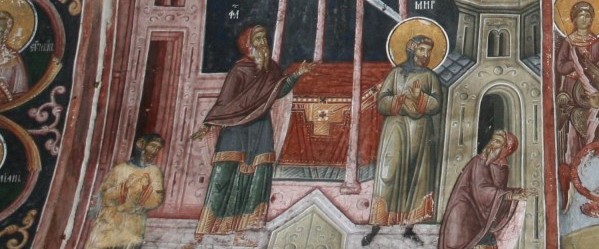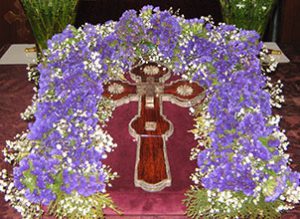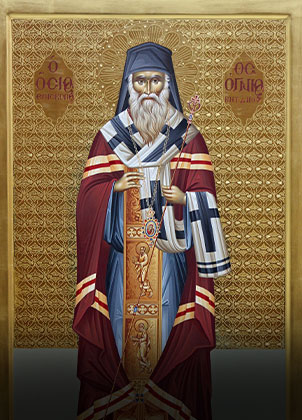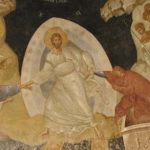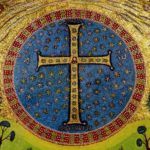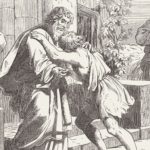Во имя Отца и Сына и Св. Духа.
Братья и сестры,
Великий Пост есть особое время года, определенное на покаяние. Время, в которое мы пересматриваем свою жизнь, сверяя ее с заповедями Божиими. Постная Триодь, книга, которая ведет нас через весь Пост, и преимущественно учит покаянию, начинает свой цикл великопостных богослужений за три недели до Поста с Евангельской притчи о Мытаре и Фарисее. Отсюда видно, какое важное значение имеет эта притча для христианской жизни.
Также и четвертая седмица Поста в Триоди снова посвящается разбору притчи о Мытаре и Фарисее.
Притча о Мытаре и Фарисее, несмотря на свою краткость и простоту, несет в себе глубочайший смысл. В нескольких словах она обозначает правильное, спасительное направление духовной жизни в лице Мытаре, и напротив, ложное направление в лице Фарисея.
Нам необходимо внимательно изучить ее.
Притча изображает двух человек молящихся в храме, Фарисея и Мытаря.
Фарисеи были строгими приверженцами Божьего Закона. Это были люди, ищущие праведности через точное соблюдение Закона. Напротив, мытари – сборщики налогов – были люди падшие, потерявшие совесть, злоупотреблявшие своим положением для незаконного обогащения.
Таким образом, притча изображает праведника и грешника, предстоящих перед Богом. Господь, знающий тайны сердца, открывает то, чего никто другой не мог бы узнать: грешник вышел из храма оправданным, а праведник был отвергнут от лица Божия.
«Ибо всякий, возвышающий сам себя, унижен будет, а унижающий себя возвысится». (Луки 18, 14) – так заключает Господь Свою притчу.
Величайшая трагедия, что человек, ищущий праведности, желающий угодить Богу, в действительности, неприметно для самого человека, может удаляться от Бога, и даже становиться врагом Божиим. И это не преувеличение. Св. Писание говорит, что: «Бог гордым противится, смиренным же дает благодать» (Иакова 4,6). Что может быть страшнее, чем иметь противником Самого Бога?
Отчего же это может произойти?
Евангельская притча ясно отвечает на этот вопрос. Оттого, что человек возвышает сам себя, приписывая себе какие-либо добродетели, подобно Фарисею из притчи, который хвалился перед Богом своими добрыми делами. Фарисей был отвержен за то, что возвышал сам себя.
Отсюда видно, что признающие за собой какие-либо достоинства, видящие в себе хорошие качества и добрые дела, стоят на опасном пути Фарисея.
Но как можно не видеть очевидного? Если, например, кто-либо сделал доброе дело, как он может не видеть этого? Апостол Павел дает нам указание. Он в послании к Коринфянам описывает свои великие апостольские труды, все, что он претерпел за проповедь Евангелия, и в заключение говорит: «не я все это совершил, а благодать Божия, которая со мной».
Если мы примем к сердцу эту мысль Апостола, то никакие наши успехи не приведут нас в гордость, потому что мы все будем приписывать не себе, а благодати Божией невидимо присутствующей в нашем сердце и во всем содействующей нам.
Нужно утвердить в чувстве сердца мысль, что мы не какие-то автономные существа, – мы создание Божие. Мы во всем, по душе и по телу, полностью зависим от нашего Творца. Он дал нам жизнь и ввел в этот мир для того, чтобы мы были угодными Ему, и исполняли Его заповеди.
Притча о Мытаре и Фарисее показывает нам, что перед Божьим судом только одно достоинство имеет значение: смирение. Есть только одна шкала, по которой можно правильно определить состояние нашей души: эта шкала имеет смирение с одной стороны и гордость с другой. Чем больше человек растет в смирении, т. е. в низком мнении о себе, тем больше он возвышается; и наоборот, чем больше развивается высокое мнение о себе, тем больше он падает.
Конечно, всякий скажет о себе: «я грешен», но трудно избавиться от тайного самомнения, кроющегося в сердце.
Св. Иоанн Лествичник так определяет гордость: «Гордость – это крайняя нищета души, которая воображает о себе, что она богата».
Т. е. когда мы гордимся чем-либо, мы лишь обманываем себя, приписывая себе то, чего в действительности не существует.
Напротив, о смирении св. Иоанн говорит, что оно есть «великое богатство».
Неслучайно в притче Господь поставил образцом смирения Мытаря. Мытарь в течение всей жизни собирает свое неправедное богатство, обогащаясь понемногу от каждого человека, с кем он имеет дело. Подобно этому и мы должны из каждого случая, из каждого обстоятельства, встречающегося в жизни, извлекать духовную прибыль.
Как же можем мы собирать богатство смирения от наших ближних?
Св. Отцы учат, что смирение рождается от познания себя. Но как может человек познать себя? Общение с людьми обнажает наши немощи: раздражительность, зависть, самолюбие, обидчивость, скупость и т. п. Именно наши ближние дают нам возможность увидеть в себе эту внутреннюю нечистоту, которую мы не замечали в себе, пока случай (а лучше сказать, Промысл Божий) не устроил так, что все это вышло наружу при общении с ближним.
Если мы замечая в себе подобные греховные немощи, в каждом таком случае будем винить во всем себя, а не ближнего, который был только орудием Промысла Божия, то мы будем стоять на верном пути. При обнаружении своих внутренних немощей, будем каяться перед Богом, смиряться перед ближним и во всем винить себя, а не других.
Мытарь собирает свое богатство незаконным способом. Так и богатство смирения приобретается как бы неправедным образом, т. е. не от подвигов и добрых дел, а напротив, от немощей, грехов и падений.
Будем всегда помнить, что цель нашей жизни состоит именно в том, чтобы приобрести хотя бы крупицу золота Мытаря, то есть смирения.
Аминь
In the name of the Father, and of the Son and of the Holy Spirit.
Brothers and sisters,
Great Lent is a special time of the year, designated for repentance. It’s a time to revise our life, comparing it to God’s commandments. The Lenten Triodion, the book that guides us through the entire Lent and predominantly teaches us repentance, begins its cycle of Lenten church services three weeks before the actual Lent, beginning with the Gospel parable of the Pharisee and the Publican. It can be seen from this fact how important this parable is for the Christian life.
Likewise, the fourth week of Lent is again dedicated to the parable of the Pharisee and the Publican.
Despite its brevity and simplicity, the parable of the Pharisee and the Publican carries the most profound meaning. In just a few words, it denotes the correct, salvific direction of a Christian life in the person of the Publican, and the opposite, false direction in the person of the Pharisee.
It’s essential that we study it carefully.
The parable portrays two individuals praying in the temple, a Pharisee and a Publican. The Pharisees were strict adherents of God’s Laws. These were people that sought righteousness through the exact observance of the Law. Conversely, the publicans – tax collectors – were fallen people who lost their conscience and abused their position in enriching themselves illegally.
Thus, the parable depicts a righteous man and a sinner standing before God. Knowing the secrets in the heart, the Lord reveals that which no one would be able to know: the sinner left the temple justified while the righteous man was repulsed from God’s presence.
And the Lord concludes His parable with: “Everyone who exalts himself will be humbled, and he who humbles himself will be exalted” (Luke 18:14).
The great tragedy is that a person seeking righteousness and desiring to please God, in reality and not noticeable to himself, can distance himself from God and even become His enemy. And this is not an exaggeration. The Holy Scripture states: “God resists the proud, but gives grace to the humble.” (James 4,6). What could be more horrifying than to have God Himself as your enemy?
How can this happen? The Gospel parable clearly answers this question. It comes when a person exalts himself, ascribing to himself any kind of good deeds, like the Pharisee in the parable, who boasted of his good deeds before God. The Pharisee was rejected for having exalted himself.
From this, it can be seen that crediting yourself with some kind of worthiness: seeing in yourself good qualities and good deeds, all stand on a dangerous path of the Pharisee.
But how can you not see the obvious? If, for example, someone performed a good deed, how can he not see it? Apostle Paul gives us an indication. In his Epistle to the Corinthians, he describes his great Apostolic labours and all he endured for preaching the Gospel, and concludes with: “it’s not I that accomplished this but God’s grace which is with me”.
If we adopt this Apostle’s thought in our heart, no amount of successes will ever lead us to pride, because we will not ascribe them to ourselves but to God’s grace that is present in our hearts and cooperating within us in everything.
We have to establish the thought in our heart that we are not some kind of autonomous being – we are God’s creation. We are fully dependent upon our Creator in our soul and our body. He gave us life and led us into the world so that we would be pleasing to Him and fulfil His commandments.
The parable of the Pharisee and the Publican shows us that before God’s judgment, there is only one merit that has any significance: humility. There is only one scale that can correctly determine the condition of our soul: this scale has humility on one side and pride on the other.
The more a person grows in humility i.e. low opinion of one’s self, the more he ascends: and opposite to this, the more a high opinion develops about one’s self, the more he declines.
Of course, everybody will say of himself: “I am a sinner”. But it is hard to escape from the concealed pride hidden in the heart.
Saint John of the Ladder determines pride thus: “Pride is the extreme poverty of the soul, which imagines that it is rich”.
That is, when we take pride in something, we are only deluding ourselves by ascribing to ourselves something which in reality doesn’t exist.
In contrast, Saint John states that humility is a “great wealth”.
It wasn’t by accident that the Lord placed a publican as a model of humility. A publican gathers his unrighteous wealth, enriching himself gradually from every person with whom he has dealings. Akin to this, from every occasion: from every situation that we meet in life, we must extract a spiritual gain.
How can we gather the wealth of humility from our neighbours?
Holy Fathers teach that humility is born from knowing oneself. But how can a man come to know himself?
Communing with people bares our infirmities: irritability, envy, ego, grumpiness, avarice etc…It is precisely our neighbours that give us an opportunity to see within ourselves this inner uncleanliness, which has remained unnoticed, until an occasion (or better to say God’s Providence) was arranged for all of this to emerge through a communion with neighbours.
If we notice similar sinful infirmities within us, let us blame ourselves in every case and not the neighbour, who was only an instrument of God’s Providence and as a consequence, we will be standing on the correct path. With the uncovering of our inner infirmities, let us repent before God, be humble before our neighbours and blame ourselves for everything and not others.
A publican gathers his wealth through unlawful means. Likewise the wealth of humility is obtained by, so to speak, unlawful means i.e. not from ascetic efforts or good deeds, but quite the opposite – from infirmities, sins, and failings.
Let us constantly remember that the aim of our life consists specifically of acquiring at least a grain of the Publican’s gold – humility.
Amen

